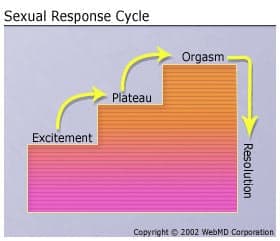The sexual response cycle refers to the sequence of physical and emotional changes that occur as a person becomes sexually aroused and participates in sexually stimulating activities, including intercourse and masturbation. Knowing how your body responds during each phase of the cycle can enhance your relationship and help you pinpoint the cause of any sexual problems.
What Are the Phases of the Sexual Response Cycle?

The sexual response cycle has four phases: excitement, plateau, orgasm, and resolution. Both men and women experience these phases, although the timing usually is different. For example, it is unlikely that both partners will reach orgasm at the same time. In addition, the intensity of the response and the time spent in each phase varies from person to person. Understanding these differences may help partners better understand one another's bodies and responses, and enhance the sexual experience.
Phase 1: Excitement
General characteristics of the excitement phase, which can last from a few minutes to several hours, include the following:
- Muscle tension increases.
- Heart rate quickens and breathing is accelerated.
- Skin may become flushed (blotches of redness appear on the chest and back).
- Nipples become hardened or erect.
- Blood flow to the genitals increases, resulting in swelling of the woman's clitoris and labia minora (inner lips), and erection of the man's penis.
- Vaginal lubrication begins.
- The woman's breasts become fuller and the vaginal walls begin to swell.
- The man's testicles swell, their scrotum tightens and begin secreting a lubricating liquid.
Phase 2: Plateau
General characteristics of the plateau phase, which extends to the brink of orgasm, include the following:
- The changes begun in phase 1 are intensified.
- The vagina continues to swell from increased blood flow, and the vaginal walls turn a dark purple.
- The woman's clitoris becomes highly sensitive (may even be painful to touch) and retracts under the clitoral hood to avoid direct stimulation from the penis.
- The man's testicles tighten.
- Breathing, heart rate, and blood pressure continue to increase.
- Muscle spasms may begin in the feet, face, and hands.
- Muscle tension increases.
Phase 3: Orgasm
The orgasm is the climax of the sexual response cycle. It is the shortest of the phases and generally lasts only a few seconds. General characteristics of this phase include the following:
- Involuntary muscle contractions begin.
- Blood pressure, heart rate, and breathing are at their highest rates, with a rapid intake of oxygen.
- Muscles in the feet spasm.
- There is a sudden, forceful release of sexual tension.
- In women, the muscles of the vagina contract. The uterus also undergoes rhythmic contractions.
- In men, rhythmic contractions of the muscles at the base of the penis result in the ejaculation of semen.
- A rash, or "sex flush" may appear over the entire body.
Phase 4: Resolution
During resolution, the body slowly returns to its normal level of functioning, and swelled and erect body parts return to their previous size and color. This phase is marked by a general sense of well-being, enhanced intimacy and, often, fatigue. Some women are capable of a rapid return to the orgasm phase with further sexual stimulation and may experience multiple orgasms. Men need recovery time after orgasm, called a refractory period, during which they cannot reach orgasm again. The duration of the refractory period varies among men and usually lengthens with advancing age.

